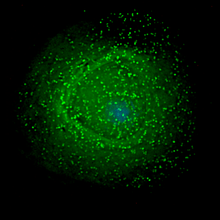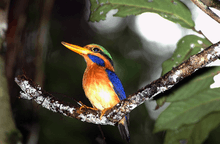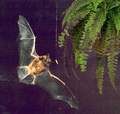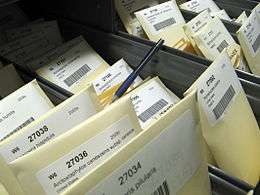PLOS Biology
Abbreviated title (ISO 4) | PLoS Biol. |
|---|---|
| Discipline | Biology |
| Language | English |
| Edited by | Emma Ganley and Christine Ferguson |
| Publication details | |
| Publisher | |
Publication history | 2003–present |
| Yes | |
| License | Creative Commons Attribution License |
| 8.668 | |
| Indexing | |
| ISSN |
1544-9173 (print) 1545-7885 (web) |
| Links | |
PLOS Biology is a peer-reviewed scientific journal covering all aspects of Biology. Publication began on October 13, 2003. It was the first journal of the Public Library of Science. PLOS Biology is an Open access journal published under the Creative Commons Attribution license. To fund the journal, the publication's business model requires that, in most cases, authors will pay publication costs.[1][2]
Scope and content
PLOS Biology has a broad scope and looks to publish high profile original research in all fields of Biology.[1][3]
"The founders of PLoS Biology have set their sights high in terms of the quality of the research they intend to publish. Their goal is to publish high-profile original research of great significance in all fields of Biology and in crossover areas with other disciplines."— Todd Eckdahl, Cell Biology Education[1]
In addition to research articles, PLOS Biology publishes magazine content via a selection of named article types. These include Essays, Unsolved Mysteries, Editorials and Synopses.[4][5] The magazine section of PLOS Biology aims to make science accessible to a broad audience. These articles are directed at a readership that extends beyond the traditional research community and that includes scientific educators, students and the interested public.[1]
Indexing and archiving
PLOS Biology is indexed in PubMed, MEDLINE, PubMed Central, Scopus, Google Scholar, the Chemical Abstracts Service (CAS), RefAware, EMBASE, PsychInfo and Web of Science. PLOS Biology is formally archived via PubMed Central.
Open access
PLOS Biology publishes under the Open access license PLOS applies to all its published works, the Creative Commons Attribution license (CC-BY).[6][7][8]
Using CC-BY, PLOS authors retain ownership of the copyright for their article, but anyone can download, reuse, reprint, modify and/or distribute articles, as long as the original authors and source are cited. No permission is required from the authors or the publishers.[9][10]
Metrics
Mike Taylor of Discover Magazine said in 2012 that while PLOS Biology has a high impact factor, "PLoS has de-emphasized this traditional, problematic measure, so you won’t find this fact blazoned across their website."[11]
PLOS Biology uses "Article Level Metrics" (a suite of altmetrics) to provide a measure of the impact of their published articles.[12] PLOS Biology articles display numbers of page views, downloads, citations, social bookmarking and dissemination activity, media and blog coverage.[13][14][15]
Semantic links
PLOS Biology recommends usage of RRIDs as provided by SciCrunch.
Gallery
Due to their CC-BY licensing, files from PLOS Biology can be reused in places other than the original article, e.g. to illustrate Wikipedia articles.
 HIV attacking a macrophage.
HIV attacking a macrophage.
 A bat flying at night.
A bat flying at night. Specimens in a seedbank.
Specimens in a seedbank.
-PLoS.jpg) Pea aphids feeding on peas.
Pea aphids feeding on peas. A bee performing its waggle dance.
A bee performing its waggle dance. An impression from a wildfire.
An impression from a wildfire. Haast's eagle attacking a moa.
Haast's eagle attacking a moa.
References
- 1 2 3 4 Eckdahl, Todd. "Review of: PLoS Biology—A Freely Available, Open Access Online Journal". Cell Biol Educ. 3 (vol. 3 no. 1): 15–17. doi:10.1187/cbe.04-01-0026. Retrieved 5 December 2014.
- ↑ "Publication Fees". plos.org. PLOS. Retrieved 9 December 2014.
- ↑ Adam, David. "Scientists take on the publishers in an experiment to make research free to all". The Guardian. The Guardian. Retrieved 5 December 2014.
- ↑ "PLOS Biology Magazine". PLOS Biology. Retrieved 2 April 2014.
- ↑ "Public Library Of Science Launches PLoS Biology". Science Daily. Science Daily. Retrieved 5 December 2014.
- ↑ "Who uses CC?". creativecommons.org. Retrieved 2 April 2014.
- ↑ Solon, Olivia. "Science wins as PLoS goes hard on Open Access". http://www.wired.co.uk/. Wired. Retrieved 5 December 2014. External link in
|website=(help) - ↑ Mestel, Rosie. "Journal Is Giving Science Back to the People". LA Times. LA Times. Retrieved 5 December 2014.
- ↑ "Open Access License". PLOS. Retrieved 2 April 2014.
- ↑ Lee, Jyh-An (2012). Nonprofit organizations and the intellectual commons (1 ed.). Cheltenham, UK: Edward Elgar. p. 56. ISBN 9781781001578. Retrieved 5 December 2014.
- ↑ Taylor, Mike. "It’s Not Academic: How Publishers Are Squelching Science Communication." Discover Magazine. February 21, 2012. Retrieved on March 3, 2012.
- ↑ "Article Level Metrics". http://www.sparc.arl.org/. SPARC. Retrieved 5 December 2014. External link in
|website=(help) - ↑ "Overview Article Level Metrics". PLOS. Retrieved 2 April 2014.
- ↑ Davis, Phil. "PLoS Releases Article-level Metrics". http://scholarlykitchen.sspnet.org/. Scholarly Kitchen. Retrieved 5 December 2014. External link in
|website=(help) - ↑ Binfield, Peter. "Article-Level Metrics at PLoS - what are they, and why should you care". www.youtube.com. YouTube. Retrieved 5 December 2014.
External links
| Wikimedia Commons has media related to PLoS Biology. |